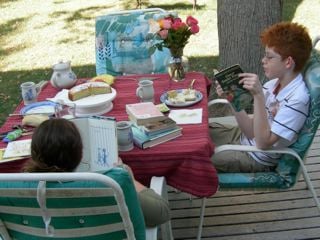What makes your best friend your best friend?
When kids are unhappy
Over the course of your 10-20 year homeschool odyssey, your kids are going to be unhappy at times. Some of the unhappiness will last months (maybe a year!). Sometimes you’re unhappy and it bleeds into the family culture. Let’s look at how to address some of the boredom and crankiness that visits the various ages and stages of children in your house.
Kids express unhappiness the way kids do:
- boredom
- anger
- fidget-i-ness
- being silly
- procrastinating
- pretending not to listen
- picking on a sibling or the family dog
- tears
- staring blankly out a window
- arguing
- campaigning for what they think will make them happy
- calling someone else a bad name
- doing poorly executed work
- not caring
- not investing
- giving up
- pretending to be happy when they really aren’t
- showing signs of stress and anxiety (sleeplessness, restlessness, not interested in eating)
- comparing your home to someone else’s
- rejecting your values
- siding with the other parent who momentarily seems more fun
A 4-5 year old who is bored is much easier to rescue than a teenager who feels suffocated and has decided to challenge the values of the family. Yet the underlying feeling is similar—it’s unhappiness—and we can facilitate a huge turn around in how our kids experience our homes and “schools” if we help them become peaceful, cooperative, empowered-from-within, happy kids again.
Tuning into your child
Any child who is unhappy needs a parent to tune in and take notice! You’re the adult: you get to set aside your agenda to find out what your child needs.
The toddler needs physical touch and expression of energy (hugs, tickles, eye contact, being flipped upside down, wrestling, chasing, jumping up and down on a bed) to get the adrenaline flowing, to feel reconnected, to up-end a mood. Sometimes food, sometimes a nap, sometimes a cuddle on the couch is enough.
The young child benefits from focused attention on his or her specific interests. Too much time spent on your agenda will lead to tedium and crankiness. Bend low to make eye contact first. Then: a board game, running around the back yard, sitting in your lap for a picture book, helping you set the table for a snack, playing on the floor, singing to a CD…these help pull the young child out of the helpless, resentful mood of too many days in a row of someone else’s agenda.
The middler needs a dedicated time regularly (every day? every other day?) where there is no limit (reading as long as he or she likes without having to do anything else or without being required to sleep, playing a computer game without a timer ending the turn, watching TV and lying on the couch without having to get up, being allowed to finish the entire math book because he’s on a roll, digging a hole in the backyard as deep and wide as she likes, taking a scandalous amount of time to organize a bookshelf or rearrange the bedroom furniture, going to the zoo or the museum or the park or the nature preserve to indulge whatever interest is currently on fire, practicing a musical instrument for an entire day).
Middlers are curious. They benefit from indulgence in their curiosity and they especially appreciate it when you “get it.” If you notice that a particular child is obsessed with a hobby right now, take advantage of that white heat of passion and let them go! Buy a book, or rent a DVD, or take a field trip, or purchase new equipment, that adds meaning and energy to the passion. (And yes, I include the Wii, XBox 360, online gaming, and Play Station in this list of “passions” just like I include an absurdly long time of pining for American Girl Doll accessories while paging through a catalog. I’ve seen good stuff come from these sources in kids.)
The young teen is often the most moody and the hardest to cajole out of the mood. We’ve got hormones raging and they are old enough to feel the “been there, done that” of homeschool. They’re looking for adventure, yet they are not quite old enough to take charge and make it happen. Try a conversation about BHAGs (Big Hairy Audacious Goals). Ask them if there were no monetary limits and no time limits and no travel limits, what might they like to do? You might find out that your teen wants to take piano lessons for the first time, or wants to join a sports team, or a theater troupe, or learn Klingon, or go to Space Camp, or become expert at fashion. You may not cure the moodiness, but you can facilitate a brand new, grown-up adventure to buffer the sense of tedium that encroaches at ages 13-14. Talk to the teen! Find out what’s missing. Do the best you can to help it happen (you might need that teen to earn money or find someone to drive them or to start small and build—but put that goal somewhere visible and all of you work toward it).
The older teen is nearly at adulthood and feeling the tug between wanting a “mommy” and wanting to be respected as a “fledgling adult.” Risk and adventure. That’s what they need. Let them lead you into conversations about their interests, their viewpoints that aren’t yours, their anxieties. These conversations happen best one-on-one, with yummy food or drinks. Make time for the older teen and remember: they are gone A LOT! So if one comes home at midnight ready to talk, you get the toothpicks out to prop your eyelids open and you sit on the bed and talk. The older teen sometimes needs to challenge how he or she was raised and you need to go soft inside and let those words slide over you. They aren’t the final verdict. They are the words of a “near adult” trying to find his or her way this week. Be interested, be quiet, be curious, be gentle, be willing to take it.
Bottom Line:
You can’t keep everyone happy all the time and be happy yourself. Not possible! What you can do is pay attention, remind yourself that these years are fleeting (no matter how today feels), and that the needs of your children are reasonable and real. Just like yours. You may not fix any of it in a day, but you can do One Thing today to help alleviate some of the building pressure in the home. If you have Many Children (like so many homeschoolers), you’ll need help! Tag team with the co-parent or a friend. Get the community involved (youth workers, coaches, aunts and uncles, grandparents).
Take Care of You:
You need to be happy too: vitamins, exercise, therapy (it helps if you need it!), time alone, a passion or hobby, a good relationship with your significant other, and a source of joy each day (tea, flipping through a magazine, bubble bath, chocolate, gardening, your favorite rerun on TBS, your spiritual practice).
You can do it!
Image by Andrew Stawarz (cc)
Friday Freewrite: My house
What is your favorite room in your home and why?
Tuesday Teatime!

Time for tea. Get out those poetry books.
Here’s what a few of our moms are saying about poetry teatimes:
I am currently reading ‘The Writer’s Jungle’ and introducing some Bravewriter Lifestyle elements into our day.
We had tea-time today and I was so impressed. I told the kids we would be doing some copywork as well but that they could choose their own. So we had and tea/chocolate, cakes and biscuits. I read some poetry and dd16 read a poem. Then, everybody started working on their own choice copywork. My kids are 16, 15, 13, 11, 9 and 7 and they were ALL engaged in what they were doing. We had a variety of copywork from Pride and Prejudice, and Jane Eyre, down to Green Eggs and Ham. Ds 7, who was writing from Green Eggs and Ham, kept asking for more paper so he could write more. Dd9 went back to her copywork twice more during the day because she wanted to. Dd13, who doesn’t ‘like’ writing was happy to write one of her favorite scenes from Farmer Boy. Even dd15, who I thought would be the one most likely to dislike the copywork idea, wrote over a page copied from a scene that amused her from Pride and Prejudice. We had such a good time and I felt that we really achieved something (as did they, considering I excused them from grammar for the day…..).
I have to say that reading TWJ is revolutionising the way I am approaching writing and language arts in general. I’ve finally found something that I feel will help my children develop the ability to enjoy writing and to ‘write from the heart’ and have a voice, not just write stilted pieces that follow a set of rules that some book or program sets out. I don’t know if I’m making sense, but *I* know what I mean I’m really excited. (Linda in Oz)
Tea, check. Oreos, check. Poetry books, check. Loving it, check. (Janet)
Dear Julie- I just want to say thank you. We are entering our 12th year of homeschooling, and I’m tired! I have a senior, a kindergartener and everything in between this year. And I am truly looking forward to our Teatime Tuesdays! It may be the ONLY thing that gets done regularly and I’m ok with that…my kids are turning out just fine. And by the way I had to tell you that my son BJ who has taken several BW courses scored amazingly well (98%)on his written/language admissions exam for our local JC. This is the same boy who only 3 years ago could not spell “girl”. I had faith in the BW philosophy even when he didn’t. THANK YOU!! (Laura)
Just wanted to say thank you for being a part of our world! Although we are only a month into our school year, the boys (ages 8 & 6) look forward to tea every Tuesday! Who would have thought the would enjoy poetry so much? This is what home schooling is all about! (Michelle)
Join the movement! Time for tea and poetry!
When your kids are happy, they write. When your kids write, you’re happy.
Win. Win.
Friday Freewrite: In hiding
Write about a time you hid from someone. Why? Where did you go? What happened?


















